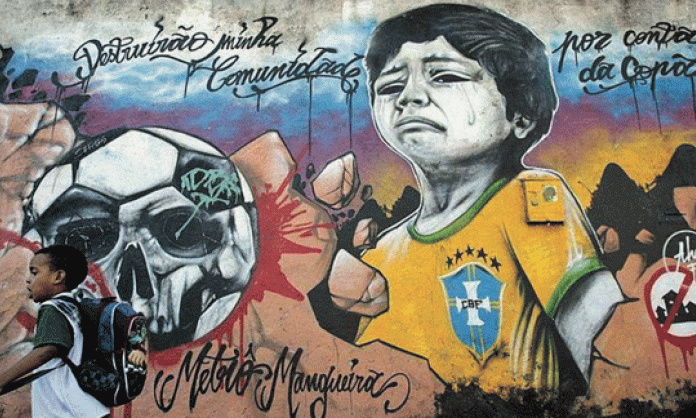I love football (“soccer” for some). I have spent countless hours playing, watching, coaching and studying it – and hope to do so for many years to come.
Yet, like almost all social and leisure activity under capitalism, football is commercialised, turned from pastime to product. Never is this more apparent than during World Cups. Right now you couldn’t avoid football if you wanted to. Not only has the Cup registered new records for television viewing globally, but it has also managed some converts, with millions of viewers in Australia and the US.
Of course, viewers and fans are potential corporate customers, spending billions of dollars in gambling, merchandise, cable TV and related entertainment. Not for nothing did FIFA force Brazil to lift its stadium alcohol ban.
Fortunately, there are always ingenious fans. Possibly none more so during this World Cup than those the elites have labelled the “chuligans” – combining “hooligan” with the disparaging term Chile’s old elites used for the poor and criminal, “chulo”. Tens of thousands of working class Chileans made the trip to Brazil, many travelling thousands of kilometres by road, sleeping in cars, parks and beaches and even selling food and merchandise in Brazil to pay for stadium tickets.
Most disgracefully, according to the establishment, a group of them even tried to get into the Maracaná stadium via the press gallery, without paying the going price of $2,500 a ticket. Never one to lose an opportunity to make a buck, FIFA is imposing a fine on Chile’s football federation for the insolence of its fans.
Football the commodity is measured by its exchange value, its use or pleasure value becoming a rather secondary consideration. But it’s not just about making money. Football has also been used as an opiate, to numb the senses and distract people from the suffering and dullness of everyday life and to promote competition, individualism and the values and morality of capitalism.
This goes back to the origins of football, when the regulation of play was used to stamp out the moral turpitude that British rulers blamed for their empire’s decline. As Jonathan Wilson puts it in Inverting the pyramid: A history of football tactics, “Team sports, it was thought, were to be promoted, because they discouraged solipsism, and solipsism allowed masturbation to flourish, and there could be nothing more debilitating than that.”
Fascism, in particular in Italy, made much use of football as a propaganda and ideological tool. Mussolini invested in stadiums and infrastructure and used football to promote nationalism and the ideas of purity, superiority and discipline – all important elements in the mass psychology of fascism. “Whether beyond or within the borders, sporting or not, we Italians shook and still shake with joy when seeing in these thoroughbred athletes … such a symbol of the overwhelming march of Mussolini’s Italians”, said Londo Ferretti, Mussolini’s press officer, in Lo Sport Fascista after Italy’s 1938 World Cup triumph.
However, football is not always ideologically in step with the needs of capitalism. The story of football in Australia provides an example. When the modern patron of Australian soccer, the late Johnny Warren, wrote Sheilas, wogs and poofters, he battled to get it published without changing the title. Warren struggled to understand why and how football in Australia – a nation spawned from the birthplace of football, British capitalism – could have been relegated to second class status among sports.
Warren made the case that football was too internationalist for Australian nationalism and inadequate for the male chauvinism that characterised this settler outpost of British capitalism. For Warren, football’s lack of popularity in Australia was a direct result of its misfit with Australian capitalist ideology: boys wanting to play football were not to be trusted; their manliness and nationalism were brought into question.
Describing football in the 1950s and ’60s, Warren recalls “tank topped, steel cap-booted, tattooed workers” yelling “Fuckin’ poofters … Dago bastards” as they hurled bottles. This is why football grew up in Australia among the migrant-based clubs, for whom the sport provided a home away from home, a haven from “Aussie” racism and xenophobia and a place to reaffirm their cultures.
Football reflects all the bad and the ugly of capitalism but it also draws from the solidarity, creative capacity and joy of ordinary people. Every four years FIFA works hard to destroy the latter, this year casting aside millions of Brazilians, employing a huge arsenal of repression and as usual promoting profit and nationalism over play and celebration.
But in the thick of it all, fans, fantastic teams and magical players sometimes manage to rise above it. The joy of football occasionally breaks through, a pleasure of pure simplicity and unabashed play, making us children again for 90 minutes or more.
[This is a reworked version of an article that originally appeared in Direct Action.]










